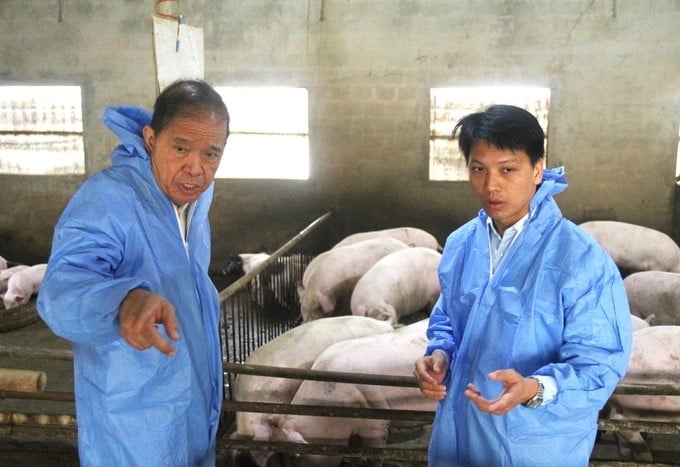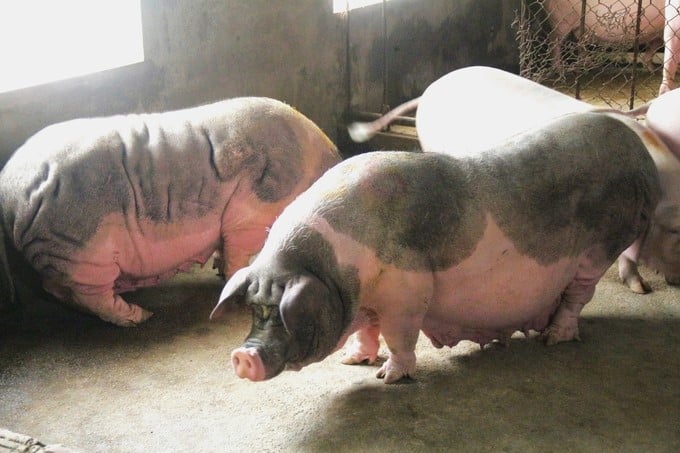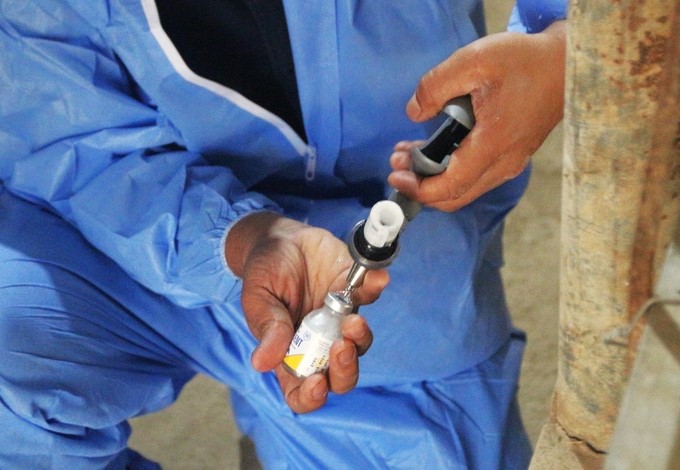May 23, 2025 | 22:45 GMT +7
May 23, 2025 | 22:45 GMT +7
Hotline: 0913.378.918
May 23, 2025 | 22:45 GMT +7
Hotline: 0913.378.918

Mr. Contante Palabrica (left) and Mr. Nguyen Van Diep exchanged expertise during a business trip of a Philippine expert delegation to survey the African swine fever prevention and control model in Lang Son province in early December 2024. Photo: Pham Hieu.
According to Mr. Nguyen Van Diep, General Director of AVAC Vietnam Joint Stock Company, recent reality shows that accelerating the large-scale use of African swine fever vaccine in many localities has made good progress. Since the beginning of the year, some provinces, such as Cao Bang, Lang Son, Hai Duong, Bac Ninh, and Hai Phong, have deployed mass vaccination against African swine fever.
"Provinces' mass vaccination against African swine fever has all shown positive results; the vaccine is safe and effective. Typically in Lang Son, after 2 months of implementation, about 90% of outbreaks have been extinguished. After 4 months, there are no new outbreaks arising," Mr. Diep informed.
The representative of AVAC Vietnam said that the results from practice will be an important database source for policymakers, especially domestic and foreign organizations such as the World Organization for Animal Health (WOAH), the Food and Agriculture Organization of the United Nations (FAO), and specialized units in livestock production and veterinary medicine, to summarize experience and evaluate the effectiveness of the African swine fever vaccine when deployed and used on a large scale. The results in Vietnam will also be the basis for other countries to boldly experiment and quickly put the African swine fever vaccine into mass use.

The Philippine expert directly vaccinated Lang Son's livestock against African swine fever. Photo: Pham Hieu.
According to Mr. Contante Palabrica, Director of the Department of Animal Health (the Philippine Department of Agriculture), before the outbreak of African swine fever in the beginning of the third quarter of 2024, the Philippines' total pig herd had about 1 million sows and 15–20 million porkers.
However, the disease has led to a sharp decline in the Philippines' pig population, with up to 40–50% of pigs being destroyed. This has caused enormous damage to the Philippine economy, especially for small livestock farmers.
"Like Vietnam, the Philippines has small and household livestock scale. These are the most vulnerable groups when diseases occur due to not being able to implement biosafety farming well. Therefore, the Philippines is very hopeful that vaccines can be used as a method to protect livestock, thereby helping Philippine farmers feel secure in repopulating their herds," said Mr. Contante Palabrica, Director of the Philippine Department of Animal Health.
The representative of the Philippines said that after a period of research and experiment, this country licensed the circulation of Vietnam's African swine fever vaccine, AVAC ASF LIVE, in July 2024 and ordered 600,000 doses, received in many batches. These imported vaccines were injected into porkers at many farms throughout the Philippines. As of now, the results of using the vaccine have shown that it is safe and effective, and the batch of vaccinated pigs is preparing to be sold.

The Philippines is currently investigating the safety of the AVAC ASF LIVE vaccine in sows. Photo: Pham Hieu.
"Currently, this vaccine has also been used at some other farms with similar results. Therefore, I went to all provinces of the Philippines to provide detailed information about vaccines to livestock farmers. Many farms have expressed their wish to use vaccines to prevent diseases in their pig herds. When receiving information from Vietnam that this vaccine is effective on both sows and boars while the Philippines is also conducting vaccination trials on sows, the delegation came to Vietnam to conduct a survey,” Mr. Contante Palabrica informed.
Accordingly, the Philippine survey delegation will rely on data from the AVAC manufacturer to evaluate the safety of the AVAC ASF LIVE vaccine on sows. Then, practical testing will be conducted on sows in the Philippines.
After the results are available, the Department of Agriculture will present proposals to the Philippine Government to issue approval for the use of the AVAC ASF LIVE vaccine on sow herds and not under government control like now, aiming to license vaccines for free circulation and widespread use nationwide.

The Philippine Government has ordered 500,000 doses of the AVAC ASF LIVE vaccine for porkers from Vietnam according to control procedures. Photo: Pham Hieu.
Mr. Contante Palabrica added that the Philippine Government has ordered 500,000 doses of the AVAC ASF LIVE vaccine for porkers from Vietnam according to control procedures. However, vaccination for sows is also considered very important. Therefore, the Philippines wishes to conduct a survey and evaluate the use of this vaccine on sows in livestock households in Vietnam to make appropriate decisions.
"We are very hopeful that the Vietnamese Government will soon approve this vaccine product for sows, which will serve as a solid basis for us in approving a similar vaccine in the Philippines," the Philippine representative expressed.
"AVAC now has more than 10 countries registering as distributors of African swine fever vaccine, such as Malaysia, Indonesia, Nigeria, Tanzania, Nepal, Myanmar, and India. However, current research data on African swine fever and vaccines are still very limited. The World Organization for Animal Health also does not have standards to evaluate vaccines. Thus, I hope that the positive results in the mass use of the African swine fever vaccine in Vietnam or in the Philippines will become important evaluation bases for other countries," Mr. Nguyen Van Diep shared.
Translated by Thu Huyen

(VAN) The People's Committee of Tra Vinh province has approved an adjustment to the investment policy for the Green Hydrogen Plant project, increasing its area to approximately 52.76 hectares.
![Reducing emissions from rice fields: [2] Farmers’ commitment to the soil](https://t.ex-cdn.com/nongnghiepmoitruong.vn/608w/files/news/2025/05/05/dsc08881jpg-nongnghiep-140632.jpg)
(VAN) Clean rice cultivation model in Thuong Tan commune, Bac Tan Uyen district, is assisting local residents in achieving sustainable agriculture by substantially reducing costs, increasing productivity, and protecting the environment.

(VAN) At the conference to disseminate Resolution No. 68, AgriS introduced its digital agricultural ecosystem and reaffirmed its commitment to accompanying the Government in promoting private sector development and sustainable agriculture.

(VAN) 'Blue Ocean - Blue Foods' initiative is designed to restore marine ecosystems and establish sustainable livelihoods for local communities by cultivating a minimum of 1,000 hectares of cottonii seaweed in the first three years.
/2025/05/21/4642-3-112707_603.jpg)
(VAN) The V-SCOPE project has made direct contributions to three out of six pillars of the Comprehensive Strategic Partnership between Vietnam and Australia.

(VAN) Facing the threat of rabies spreading to the community, Gia Lai province urgently carries out measures to vaccinate dogs and cats on a large scale.

(VAN) Disease-free livestock farming not only protects livestock herds but also stabilizes production and livelihoods for many farmers in Tuyen Quang.